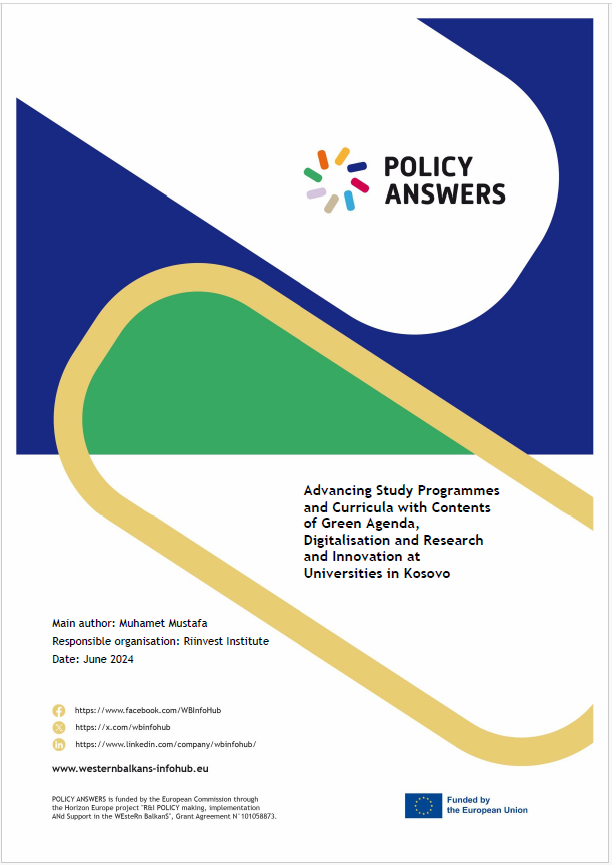This POLICY ANSWERS Brief was prepared in June 2024 by Muhamet Mustafa and published by the Riinvest Institute.
Higher Education Institutions (HEIs) are facing numerous challenges but also significant opportunities for improvement and advancement. Universities in the European Union (EU) countries are making continuous efforts to incorporate innovation and other priority areas of the EU. In this regard, the priorities of the EU Agenda for the Western Balkans (WB), including research and innovation, green agenda, and digitalisation, also pose serious demands for WB countries, particularly Kosovo. This report is an activity within the Horizon Europe project POLICY ANSWERS and is compiled with the aim of contributing to raising awareness among HEIs and other responsible stakeholders to develop systematic activities so that HEIs in Kosovo can take the necessary steps in line with these global developments and demands.
Innovation in most study programmes is integrated in specific fields with limited focus and is not adequately included in study programmes. According to survey findings, respondents from HEIs indicate that the subject of innovation will be directly integrated and included in various fields such as urbanism and spatial planning, architectural design, architectural heritage, building performance assessment, monitoring and control, cryptography, and industrial engineering.
The elements of the green agenda are integrated only into programmes or faculties directly or indirectly related to environmental themes. In other programmes, green agenda elements are not adequately included. Exceptions are made by some programmes, namely courses that have taken initial steps, according to survey findings. However, the challenge remains for students to acquire green skills demanded in the labour market.
Research methods are conducted across all HEIs programmes. This subject provides knowledge for students on how to design studies, analyse data, and write papers, and so on. However, all evaluated syllabi lack interdisciplinary and practical approaches that would enable students to gain skills in addition to competencies for interdisciplinary studies.
Digital competencies are either weakly integrated or not integrated at all, except in programmes within ICT related programmes. According to responses from officials, key challenges in integrating digitalisation into university programmes include infrastructure deficiencies such as outdated equipment or laboratories, insufficiently qualified staff, inadequate adaptation to digital changes, and insufficient funds for digital tools investments. Some subjects in various programmes do offer digital competencies that can prepare students for the labour market.
Several barriers affect the inclusion of thematic priorities in HEIs programme syllabi. These include lack of funding for infrastructure, equipment, and laboratories aimed at integrating theoretical and practical parts, especially the lack of academic staff skills to lecture on topics such as: digitalisation, innovation, and the green agenda.
Recommendations
1. The curricula of HEIs programmes should be interconnected with the thematic priorities of the EU Agenda for the WB through continuous dialogue with the private sector, policymakers, donors, and other interested parties, directly or indirectly involved. In this context, support structures for HEIs should be established not only to analyse curricula but also to respond promptly to the dynamics of labour market demands and needs.
2. Curricula should be developed and updated to incorporate the green agenda, digitalisation, innovation, and applied research. These curricula should be designed considering their interdisciplinary nature, integrating various fields to help students acquire competencies and appreciate challenges from different perspectives.
3. HEIs, in collaboration with responsible stakeholders, should invest more in developing internal capacities such as: infrastructure and technology adoption to facilitate and accelerate the implementation of the said components. Continuous training for teaching staff is essential to develop additional teaching competencies, particularly in green topics, digitalisation, and innovation.
4. HEIs management should pay greater attention to informing and raising lecturers’ awareness about the importance of integrating the green agenda, digitalisation, research, and innovation into study modules.
5. All HEIs should organise training sessions and workshops internally and in collaboration with each other to integrate the above-mentioned fields into their programmes and curricula. It is recommended to the Ministry of Education, Science, Technology and Innovation (MESTI) and donors involved in higher education to support such activities.
6. HEIs, research institutes, business associations, and other relevant institutions should collaborate to achieve more successful and productive integration of these components into the study subjects of HEIs.
7. Within HEIs, particularly across all faculties and departments, there should be a multi- disciplinary and interdisciplinary approach aimed at incorporating these fields, namely the green agenda, digitalisation, innovation, and scientific research, into their academic and research work.
8. There should be an increase in content and subjects related to innovation within curricula, not only in specific faculties but also in faculties where they can contribute to fostering national innovation and enhancing students’ skills. This also contributes to creating an efficient innovative ecosystem, fostering a culture that encourages innovation and bringing significant benefits to society.
9. Syllabuses should be updated to include new topics in digitalisation based on trends in technological developments. In this context, software and programming languages such as Python and R, visualisation tools like Tableau or PowerBI, and virtual laboratories should be utilised.
10. HEIs should advance their content and curricula in research fields, not limiting it solely to modules on research methods or academic skills but also involving students in research projects in collaboration with industry and businesses.
11. It is recommended that the National Council for Quality, include these fields for further accreditation criteria and requirements for HEIs in Kosovo.

